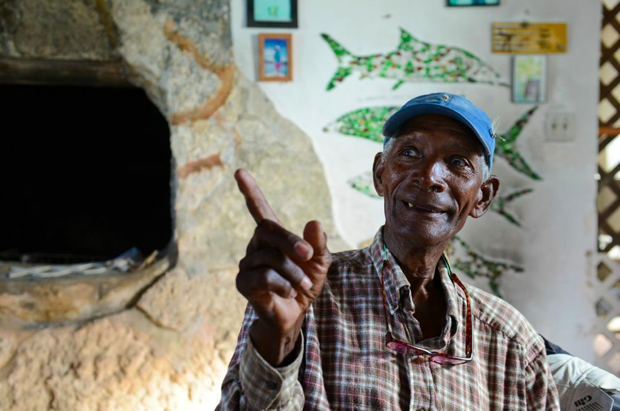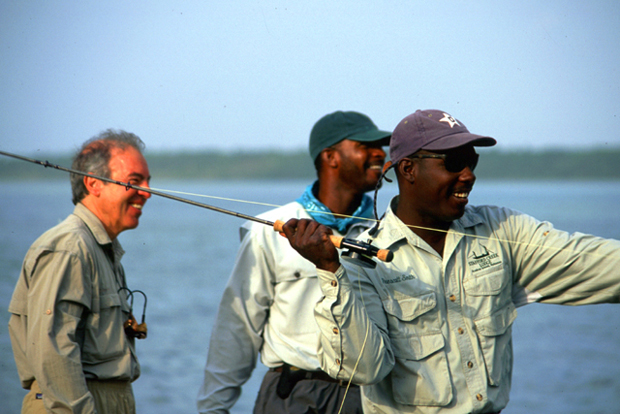Tom Karrow is a PhD Candidate at the University of Waterloo, in the Department of Geography, Environmental Management and Tourism. His research focuses on the acquisition and application of knowledge held by early, pioneering Bahamian Bonefish Guides to local resource management.
Tom Karrow – Bio
[dropcap]U[/dropcap]pon completion of a Bachelor of Environmental Studies Degree focusing on Geography and Anthropology in 1996, Tom managed a fly shop in Ontario where he honed his fly fishing skills, guided clients and taught the art of casting and fly fishing. His angling interest was sparked as a child by time on the water with his grandfather spent searching for Brook Trout in rural Ontario.
With a love for teaching, Tom returned to school in 2000, to acquire a Bachelor of Education. The following ten years were spent teaching elementary school science, technology, history and geography, as well as leading and managing schools as a school administrator. Throughout this period, Tom has remained active in the flyfishing community, guiding, instructing and starting his own Custom Fly Tying business. He has been a prostaff member for several stores in Ontario but Tom’s passion lies in saltwater angling where his time on the flats has greatly expanded his desire to work towards coastal environmental preservation; ensuring future generations have similar opportunities.
In 2011, Tom attended the Bonefish and Tarpon Trust symposium where he saw links between his experiences, qualifications and passions. Tom left the field of education shortly thereafter, and completed a Masters of Environmental Studies with his sights set on a PhD where he could work towards giving back to an industry that has given him great enjoyment, and towards protection of fragile ecosystems.

Charlie Smith, pioneering guide in the Bahamas – rich with stories of the early days of bonefishing in the Bahamas. Many of you who like to bonefish know of his “Crazy Charlie” fly. Photo credit Ian Davis of Yellow Dog Fly Fishing Adventures and Featured Image of Prescott Smith casting is also a Davis photo. Yellow Dog Fly Fishing Adventures.
Ghost Stories – Pioneering Bahamian Guides, Their Knowledge, Their Stories and Opportunities for Resource Management
Ghost Stories, is a conceptual book, film documentary and collection of short films centered on the lives of prominent pioneering bonefish guides in the Bahamas. Tom Karrow will develop these works along with a PhD dissertation, where he will be using ecosystem knowledge held by Bahamian guides for resource management in the islands.
Historically, bonefish were caught for food, and recreational angling for the species was not a priority. Early anglers like Joe Brooks, soon recognized the importance of bonefish as a recreational species, introducing cultural icons like Grey, Hemingway, American Presidents and notable celebrities to the sport. The majority of early bonefishing initiatives and techniques were established in the Florida Keys but anglers soon sought bonefish on the expansive flats found in the Bahamas where techniques and tackle for pursuing shallow-water game fish evolved. Initially Bimini was the center of Bahamian bonefishing although Andros, with extensive flats and prime Bonefish habitat soon became known as the “Bonefishing Capital of the World.” Bonefishing in the Bahamas exploded in popularity and locals quickly became experienced guides for traveling anglers, working to establish a multi-million dollar tourist industry existing today. Men like Smith, Neymour, Cleare, Rolle, Pinder, Bain and others spent countless hours on a poling tower learning the biology of flats species, and have since passed their knowledge on to their children, many of whom are now world class, highly esteemed guides.
This project will document the lives of these men, give them credit for their efforts in developing a world-wide angling phenomena and along with local Bahamian stakeholders, apply their environmental knowledge to local resource management.
If you are interested in learning more about these ventures or helping, please contact Tom Karrow directly at tkarrow@uwaterloo.ca or through his Linkedin profile by clicking here […]
Details on this research project can also be found at a Tom’s website – click here […]
[information]NOTE:
Financial support is greatly needed and very much appreciated for this research. Outcomes from this research will include: a biographical book, short films, a feature length documentary, magazine articles and speaking engagements; there are significant opportunities for company exposure through sponsorship and collaboration.
Please contact Tom directly at tkarrow@uwaterloo, Click here, or one of his collaborating partners:
The College of the Bahamas, The Bahamas Sportfishing Conservation Association (psmith@bffia.org), The Bahamas Fly Fishing Industry Association (psmith@bffia.org), The Bahamas National Trust, Fly Life Magazine.com, or Bonefish and Tarpon Trust (aaron@bonefishtarpontrust.org).
Stay tuned to Fly Life Magazine.com for regular progress updates on this important research initiative!
[/information]




Join the discussion 2 Comments